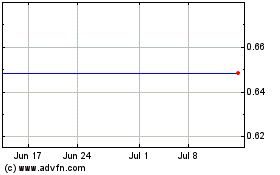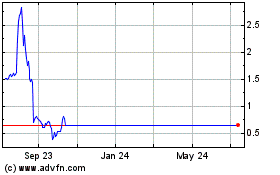Finance Watch -- WSJ
December 28 2016 - 3:02AM
Dow Jones News
FRED'S
Drugstore Chain Adopts Poison Pill
Pharmacy chain Fred's Inc. said Tuesday it has adopted a
shareholder-rights plan, less than a week after an activist
investor took a nearly 25% stake in the company.
Thursday, The Wall Street Journal reported that Alden Global
Capital had quietly amassed its stake in the company.
The poison pill, as shareholder-rights plans are often called,
could limit Alden's ability to add to its stake, as it would kick
in to potentially dilute the company's share count if an existing
large shareholder expanded its holdings or a new shareholder built
a 10% stake.
Alden didn't immediately respond to a request for comment.
Last week, Fred's shares rose sharply after Fred's said it would
more than double its size by purchasing 865 stores Rite Aid Corp.
needs to sell to close its merger with Walgreens Boots Alliance
Inc.
Fred's said Tuesday the plan reduces the likelihood for anyone
to "gain control of the company through open market accumulation
without appropriately compensating its shareholders for such
control or providing the board sufficient time to make informed
judgments."
Fred's also said it has "an ongoing dialogue with a number of
shareholders and always welcomes all constructive input," but said
it wouldn't comment on specific discussions with shareholders.
--Austen Hufford
AUTOS
China Weighs Easing Car-Loan Limitations
China is considering lifting the current 80% limit on the amount
of a car price that consumers can borrow to finance a purchase, the
central bank said Tuesday, in a fresh move by Beijing to support
the auto industry.
In a statement on its website, the People's Bank of China said
it and the Chinese banking regulator have moved to revise the
auto-finance regulation, including making the loan-to-value ratio
more flexible. Exactly how much a buyer can borrow will be set
based on broader economic factors and consultations with the
automotive industry, it added.
Under the current policy, in place since 2004, consumers can
borrow up to 80% of a car's price from banks or other financial
institutions. For used cars, the cap stands at 50% of the car
price.
The central bank said it would solicit comments about the
revised regulation in the coming month.
The proposed relaxation comes after China earlier this month
decided to extend a tax incentive for small-engine cars into 2017,
albeit at a smaller scale, to ease concerns about slowing demand in
the world's largest car market.
The Ministry of Finance said it would levy a 7.5% purchase tax
on vehicles with engines up to 1.6 liters from Jan. 1, an increase
of the current rate of 5% but below the normal 10%.
China's auto market has significantly rebounded since the last
quarter of 2015, when the government rolled out the tax break to
resuscitate the car industry. From January through November this
year, China's new-car sales were at 21.7 million vehicles, up 16%
from the same period a year earlier, when sales registered 5.9%
growth.
However, industry watchers said that the tax break has pulled
demand forward as people made purchases anticipating its
expiration. Even if the purchase tax were to remain at 5%, car
sales would slow dramatically due to this year's rush to purchase,
said Morgan Stanley in a recent report.
Auto finance has grown rapidly in China thanks to the growing
number of younger consumers that prefer credit over cash. Nearly
30% of Chinese consumers bought cars on credit last year, according
to a study by research company Sanford C. Bernstein, up from 18% in
2013. Deloitte expects that the ratio will rise to 50% in 2020.
Rose Yu
(END) Dow Jones Newswires
December 28, 2016 02:47 ET (07:47 GMT)
Copyright (c) 2016 Dow Jones & Company, Inc.
Rite Aid (NYSE:RAD)
Historical Stock Chart
From Mar 2024 to Apr 2024

Rite Aid (NYSE:RAD)
Historical Stock Chart
From Apr 2023 to Apr 2024
